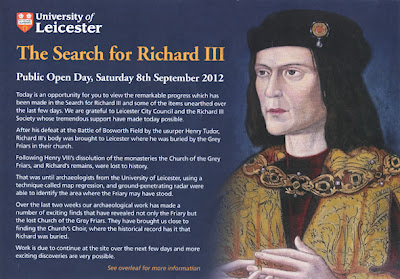I was pleased to see loads
of folks there, even if it meant queuing.
The project has obviously captured the local public imagination, -
revealing how clever it was to publicise it as a search for King Richard rather
than just the Greyfriars Friary. I
was amused to see that the world of ‘merch’ has reached the archaeological
fraternity with tee shirts and cheesy white Yorkist roses on sale,
albeit with a fairly soft sell.

The archaeologists actually
involved in the dig led the well-organised tour and, consequently, their
commentary was knowledgeable and our questions received detailed answers. As well as descriptions of what we were
looking at in their trenches, there were interesting insights into the
practical realities of carrying out such a dig in the heart of a city. Whilst they enjoy fortunate free access
to a council-owned space, it’s revealing that the only real value of the
‘geo-phys’, (beloved of Tony and The ‘Time Team’ Gang), was in showing the network of hidden drains
and cables to be avoided. In the
event, the first trench just went in where it could and, luckily, struck just
enough medieval masonry for a picture of the Friary’s ground plan to begin to
emerge.
 |
| Sections of Corridor Walls In Trench 2 |
 |
| Impressions Of Floor Tiles In Trench 2 |
 |
| Fragment of Cloister Masonry In Trench 2 |
As usual, what to the
layperson resembles a few ghost impressions in the earth and the odd
architectural fragment provides the experts with a wealth of information. As things stand, the shape and extent
of the Friary Church is appearing with the more recent trenches revealing
evidence of the chapter house and main body of the building. Amongst the artefacts on display were
fragments of a gothic window, (possibly from the east end of the Church),
decorative tiles, coins of the period but no royal skeletons.
 |
| Fragments Of Chapter House Masonry In Trench 1 |
 |
| Window Fragments From East End of Church |
It seemed the prospect of
finding Richard was less important to the archaeologists than the knowledge
they’re gaining about the Friary itself.
His actual tomb might be located under neighbouring private property or
have been destroyed by the excavation of cellars under adjacent buildings. The newest trench, in
the currently unused plot next to the main site, has revealed evidence of
Alderman Robert Herrick’s 17th Century garden where a memorial pillar to
Richard once stood. Most
prosaically, he might even lie beneath the Victorian wall now separating the
plots.
 |
| Trench 3 In Adjacent Plot, Containing Evidence of Herrick's Garden |
Their diffidence might be a defence against anticipated disappointment, evidence of differing
agendas amongst the project partners or just of the role of the University's PR dept. in the whole
process. It’s possible that,
whatever is added to the knowledge base, Richard III may remain a figure of
folklore and imagination and his memory a tool for vested interests.
 |
| University Of Leicester |
 |
| Richard III Society |
I walked home from Greyfriars via Highcross Street. Here once stood the Blue Boar Inn where Richard reputedly spent his last night before the Battle of Bosworth. Amusingly, a Travelodge now occupies the site but a tidy little pub on the same street commemorates his name.
 |
| The Travelodge From Highcross Street |
 |
| Richard III Stayed Here, (Sort Of)... |
 |
| But Not Here |














No comments:
Post a Comment